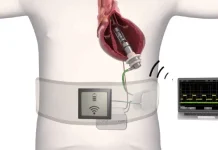PAVmed (Nasdaq:PAVM) has successfully completed the first human implants of its PortIO intraosseous infusion system, the company said today.

New York-based PAVmed designed its PortIO system with an implantable intraosseous vascular access device and insertion kit. Instead of a catheter located in a vein, the system has a short extension from the device inserted by a physician into a bone, leaving the device completely beneath the skin.
The device can be inserted and removed near-percutaneously without requiring a surgical pocket or significant dissection and it does not require confirmation of the position of the tip by X-ray or other means.
The company said this method allows for direct access to bone marrow for a well-established route to deliver medications, fluids and other substances. The company said PortIO addresses known limitations of existing long-term vascular access devices.
Physicians at the Clinica Porto Azul in Barranquilla, Colombia, successfully implanted the PortIO system in three patients as part of its IRB-approved first-in-human clinical study of up to 40 patients, PAVmed said. All patients have undergone successful infusion of fluids consistent with the study protocol and the device’s intended use without complication, PAVmed said.
“Simply stated, PortIO worked exactly as designed and intended,” PAVmed CMO Dr. Brian J. deGuzman said in a news release. “PortIO is the first implantable intraosseous vascular access device designed for long-term use and to eliminate many of the shortcomings of existing vascular access devices, including the need for regular flushing to maintain patency. We look forward to completing this FIH study to demonstrate that PortIO can serve as such a maintenance-free long-term vascular access device.”






